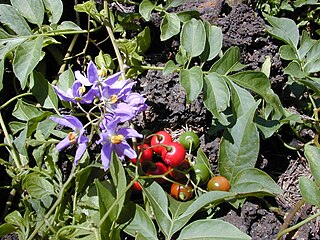
Solanum is a large and diverse genus of flowering plants, which include three food crops of high economic importance: the potato, the tomato and the eggplant. It is the largest genus in the nightshade family Solanaceae, comprising around 1,500 species. It also contains the so-called horse nettles, as well as numerous plants cultivated for their ornamental flowers and fruit.
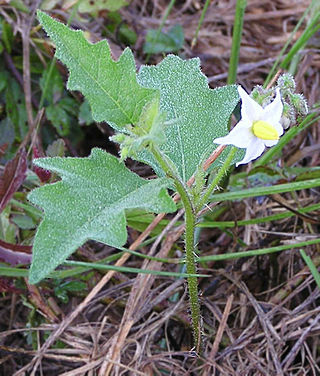
Solanum carolinense, the Carolina horsenettle, is not a true nettle, but a member of the Solanaceae, or nightshade family. It is a perennial herbaceous plant, native to the southeastern United States, though its range has expanded throughout much of temperate North America. The plant is an invasive in parts of Europe, Asia, Africa and Australia. The stem and undersides of larger leaf veins are covered with prickles.

Solanum dulcamara is a species of vine in the genus Solanum of the family Solanaceae. Common names include bittersweet, bittersweet nightshade, bitter nightshade, blue bindweed, Amara Dulcis, climbing nightshade, felonwort, fellenwort, felonwood, poisonberry, poisonflower, scarlet berry, snakeberry, trailing bittersweet, trailing nightshade, violet bloom, and woody nightshade.
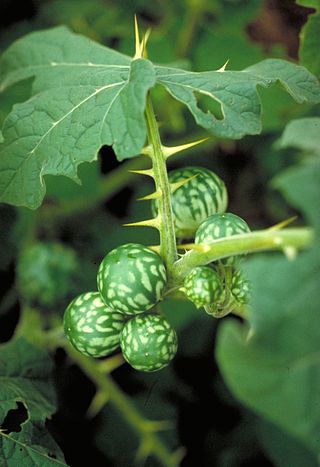
Solanum viarum, the tropical soda apple, is a perennial shrub native to Brazil and Argentina with a prickly stem and prickly leaves. The fruit is golf-ball-sized with the coloration of a watermelon. It is considered an invasive species in the lower eastern coastal states of the United States and recently on the Mid North Coast of Australia.

Solanum mauritianum is a small tree or shrub native to South America, including Northern Argentina, Southern Brazil, Paraguay and Uruguay. Its common names include earleaf nightshade, woolly nightshade, flannel weed, bugweed, tobacco weed, tobacco bush, wild tobacco and kerosene plant.

Solanum aviculare, commonly called poroporo or pōporo, bumurra (Dharug), kangaroo apple, pam plum (Australia), or New Zealand nightshade, is a soft-wooded shrub native to New Zealand and the east coast of Australia.
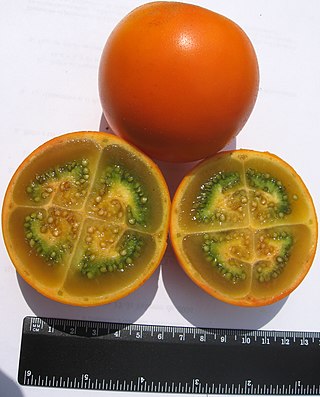
Solanum quitoense, known as naranjilla in Ecuador, Costa Rica, and Panama and as lulo in Colombia, is a tropical perennial plant from northwestern South America. The specific name for this species of nightshade means "from Quito."

Solanum americanum, commonly known as American black nightshade, small-flowered nightshade or glossy nightshade, is a herbaceous flowering plant of wide though uncertain native range. The certain native range encompasses the tropics and subtropics of the Americas, Melanesia, New Guinea, and Australia.

Solanum mammosum, commonly known as nipplefruit, fox head, cow's udder, or apple of Sodom, is an inedible Pan-American tropical fruit. The plant is grown for ornamental purposes, in part because of the distal end of the fruit's resemblance to a human breast, while the proximal end looks like a cow's udder. It is an annual in the family Solanaceae, and part of the genus Solanum, making the plant a relative of the eggplant, tomato, and potato. This poisonous fruit is native to South America, but has been naturalized in Southern Mexico, Greater Antilles, Central America, and the Caribbean. The plant adapts well to most soils, but thrives in moist, loamy soil.

Solanum muricatum is a species of evergreen shrub native to South America and grown for its sweet edible fruit.
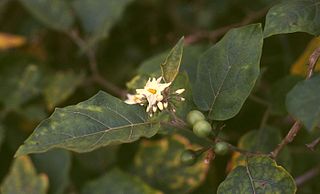
Solanum torvum, also known as pendejera, turkey berry, devil's fig, pea eggplant, platebrush or susumber, is a bushy, erect and spiny perennial plant used horticulturally as a rootstock for eggplant. Grafted plants are very vigorous and tolerate diseases affecting the root system, thus allowing the crop to continue for a second year.

Solanum elaeagnifolium, the silverleaf nightshade or silver-leaved nightshade, is a species of plant in the nightshade family native to North and South America. It is common in parts of southwestern USA, and sometimes weed of western North America. Other common names include prairie berry, silverleaf nettle, white horsenettle or silver nightshade. In South Africa it is known as silver-leaf bitter-apple or satansbos. More ambiguous names include "bull-nettle", "horsenettle" and the Spanish "trompillo".
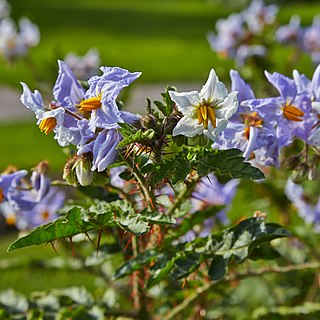
Solanum sisymbriifolium is commonly known as vila-vila, sticky nightshade, red buffalo-bur, the fire-and-ice plant, litchi tomato, or Morelle de Balbis.

Caralluma is a genus of flowering plants in the family Apocynaceae, consisting of about 120 species.

Solanum bahamense, commonly known as the Bahama nightshade, is a plant in the nightshade family. It is native across the West Indies, from the Florida Keys east to Dominica. It is a common species in coastal habitats, often on calcareous soils.

Solanum physalifolium, known as hoe nightshade, Argentine nightshade, green nightshade and hairy nightshade, is a species in the family Solanaceae. Native to Argentina, Bolivia and Chile, it is widely naturalized in Australia, New Zealand, Europe, western Canada and the north western United States. Solanum physalifolium has been widely but incorrectly known as Solanum sarrachoides, a different species. It has been listed as a noxious weed in the US states of Kansas and Michigan under this misapplied name.

Solanum tampicense, also known as wetland nightshade, aquatic soda apple, and scrambling nightshade, is a perennial in the Solanaceae or Nightshade Family. It can exist as a vine, tree, or shrub and is native to the West Indies and Central America. It is classified as a noxious weed by the United States Department of Agriculture and by several states and is known as an invasive species in the state of Florida.

Melicope adscendens is a rare species of flowering plant in the citrus family known by the common name auwahi melicope. It is endemic to Hawaii, where it is known only from the island of Maui. It is a federally listed endangered species of the United States. Like other Hawaiian Melicope, this species is known as alani.

Solanum virginianum, also called Surattense nightshade, yellow-fruit nightshade, yellow-berried nightshade, Indian nightshade,Thai green eggplant, or Thai striped eggplant, is a medicinal plant used mostly in India. Some parts of the plant, such as the fruit, are poisonous. Solanum surattense Burm. f. and Solanum xanthocarpum Schrad. and Wendl. are synonyms of Solanum virginianum L..

Ludwigia adscendens, the water primrose, is a species of flowering plant in the evening primrose family. Its native distribution is unclear. It is now a common weed of rice paddies in Asia and occurs also in Australia and Africa, but may have originated in South America.




















